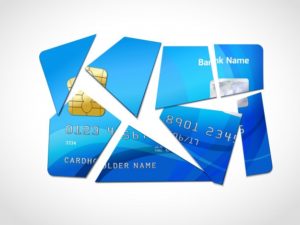Are you dealing with credit card debts? Is your income below the state median salary? If so, filing a Chapter 7 bankruptcy petition can be your way out. Many debtors who file for this type of bankruptcy have their debts wiped out by the court, but this is not always the case. While most people file for debt relief due to financial problems, others may not have their balances discharged when it is proven that their card purchases are fraudulent, among other things.
To help you deal with your debt problems, below are several scenarios you can expect to occur if you fall behind on credit card payments. If you need more guidance to understand what a Chapter 7 bankruptcy entails, it is important to get the facts from a licensed bankruptcy attorney rather than a family member or friend.
Credit Card Debts Before You File for Bankruptcy
When your credit card company notices that you have been paying your dues on time for a certain period, you can face any of the scenarios below.
- Card companies charge owners with a higher interest rate which results in a higher account balance since paying back your dues will mostly go to the interest.
- The debtor owes a higher amount as the company charges him with late fees
- A borrower experiences creditor harassment from a debt collector who will likely call you repeatedly. This is one of the top reasons why borrowers that have not been making payments for a long time are considering filing for Chapter 7 bankruptcy.
- The credit card account won’t remain open unless the company allows you to. Sometimes, even when you pay off your balance, the credit card provider can still close your account especially when they learn about a bankruptcy filing through one of the credit reporting agencies.
- You receive a debt collection lawsuit where the company demands payment. If you get sued, state laws only give you a certain time to respond before the company asks a judge for a default judgment. This courthouse judgment will be recorded and shall incur interest until it is fully paid.
- Proceeds of property sales may go to the judgment on your credit card debts.
Credit Card Debts After You File Bankruptcy
 The scenarios stated above are only some of the reasons why it is a good idea to consider a Chapter 7 bankruptcy filing. Most personal bankruptcies don’t require the filer to give up assets in exchange for debt relief. Since credit card debts are considered nonpriority claims in a bankruptcy estate, most borrowers won’t have to pay a single dime to their credit company.
The scenarios stated above are only some of the reasons why it is a good idea to consider a Chapter 7 bankruptcy filing. Most personal bankruptcies don’t require the filer to give up assets in exchange for debt relief. Since credit card debts are considered nonpriority claims in a bankruptcy estate, most borrowers won’t have to pay a single dime to their credit company.
Oe of the most common scenarios that occur after filing bankruptcy is that you receive a discharge order which states that you no longer have the financial obligation to pay back your credit card company. While most credit debt obligations are eliminated, in some cases it is also possible that the bankruptcy trustee pays your creditors what is owed.
You must also be prepared to face any of the following negative outcomes as a result of a long-record of missed card payments.
- Lenders also have the right to file a complaint to the bankruptcy judge and argue that your credit card’s past-due is nondischargeable. However, for this process to work, a creditor must challenge the dischargeability of your debt within sixty days after the meeting with creditors.
- You may be required to attend a hearing with your bankruptcy lawyer and face your creditor if they file a nondischargeability complaint and you filed an objection to their claims
- The discharge order will wipe out your debts but will not cover cosigners or guarantors. This means that if you have a cosigner or a guarantor, your creditor can go after them and oblige them to fulfill their debt repayment obligation.
- If the card balance was proven to be caused by fraudulent activity, such as giving false information, misrepresenting data, or making pretenses, then the bankruptcy court can still retain the filers’ obligation even after bankruptcy cases are closed.
The following types of purchases can be deemed fraudulent: luxury goods and cash advances. This includes luxurious goods that were bought with only one credit card or bought immediately after filing for bankruptcy. Only necessary goods and services such as food, clothing, and other living expenses can be deemed as dischargeable debts in court.
Moreover, cash advances above a certain value that is filed close to your bankruptcy application date can be presumed nondischargeable. Under the bankruptcy law, the only exemption to discharging purchases falling under these categories is when you can prove that the value is within specified limits and that there was the intent to repay the products bought.
Have you decided to file for Chapter 7 bankruptcy but need help understanding the bankruptcy process? Contact Phoenix Fresh Start Bankruptcy Attorneys today.
Bankruptcy laws can be daunting especially when you have to consider specific debts such as credit card debt. Our bankruptcy lawyers can evaluate your financial situation for free and help you find the best debt solution that works for you.











